FIA Friday press conference - Malaysia
Team Representatives - Federico Gastaldi (Lotus), Paul Hembery (Pirelli), Graeme Lowdon (Marussia), Cyril Abiteboul (Caterham), Monisha Kaltenborn (Sauber), Franz Tost (Toro Rosso)
Q: Cyril, can I begin with you? You did a lot of mileage in the pre-season testing but it’s not been so good when it’s come to the actual action, in Australia and again today. Can you give us an idea of what the problem is?
Cyril Abiteboul: Yes. To be honest we are the first one to be a bit surprised by the situation. It's true that were quite happy with the situation after the test but I think it demonstrates that it’s still a little bit random. It’s a bit random for everyone, for all parts of the car, whether it be chassis, gearbox, engine. I think we are just demonstrating that given the number of new things that there are on this car, given the regulations, they do not really send a warning before they hit you and unfortunately they are hitting us more during the season than they were hitting us before. So I mean let’s see. We are trying to stay calm, to take things as they come. Obviously we are not in the best position to prepare the weekend. But despite that we managed to have a good recovery last race in Melbourne so hopefully that happens again, even though I don’t want to try my luck too much.
Q: Specifically there were some problems with Kamui with the power unit in Australia, Was that the problem again today for him? No running at all for him.
CA: Yeah, it was a mix. It started with some issue related to the power unit and it actually continued with some issues that are more related to the clutch and gearbox. I don’t want to comment too much. It’s all the systems, all the complex systems that are on the car, in addition to the difficult serviceability of the modern cars that makes our life extremely difficult - not just us, pretty much everyone on the grid.
Q: Thank you for that. Coming to Federico Gastaldi from Lotus, the new Deputy Team Principal - congratulations. It’s not been an easy couple of races for you either, particularly today once again troubled running. What’s the situation?
Federico Gastaldi: Well we’ve been having problems with the mapping in P1 and then Pastor’s turbo blow out and we had to change the engine. We are working very, very hard with Renault trying to find out solutions for the weekend and to move forward for the next race as well.
Q: You’re the Deputy Team Principal. Can you tell us what your role actually means in terms of what you do back at Enstone and how you relate with all the rest of these people here and the FIA and FOM? What’s your role?
FG: Actually we have a new CEO and we have… the Team Principal is Gerard Lopez the chairman of the company. For the time being I will be looking to the relationship between the team and FIA, FOM and again all the partners and sponsors, during the races that Gerard is not here.
Q: Paul, coming to you? There was some talk on the radio in the second free practice session about some tyre degradation for one or two teams. What is the objective of what Pirelli is looking to achieve this year with the tyres and how they affect the racing?
Paul Hembery: It hasn’t really changed, the input that we’ve had from the teams and the promoter in that we're aiming to have races of two stops, maybe three in some cases and to create that you’re going to create a thermal degradation otherwise you won’t have the stops we’re searching for. But it was important this year that we did some work on trying to move towards less marbles on the circuit although we did a bit track cleaning today so it was quite messy, the first session. And also that the tyres life has increased. From the data we have seen so far, we appear to be in that right direction. Of course it’s all very new for the teams. It’s new for us as well, understanding what the real impact on the tyres and the car combination will be and it’s only now that we’re starting to see the teams working more on what to do with the tyres and what will eventually be part of their race strategy.
Q: Of course you’ve got the first of the new two-day, in-season tests coming up in a couple of weeks’ time. Can you tell us what’s planned and what the focus will be?
PH: We’re looking to nest season essentially and trying to evolve the product going forward in the future. We have a moving target - the cars this year it’s suggested will develop at twice the rate of a normal season, maybe that’s up to four seconds. So we have to take that into account when we’re looking at what we’re doing going forward. So we’re trying to always develop things to have available if and when they are required. We’ll see how we get on but clearly there are still some issues with the teams’ running, so I think to do testing after a race will be a big challenge for all involved but we have to be also realistic in our aims.
Q: Coming to Monisha. In what sort of mood does Sauber enter the 2014 season?
Monisha Kaltenborn: Well, in an optimistic mood because when you look at last season, were we ended, we could see that we did bring a certain change into our performance and it wasn’t looking that bad. Of course we know that this year is very new, particularly with the rule changes, and we are confident that in many areas, particularly reliability, we are pretty much where we want to be. We are not happy with the overall performance, but we have identified the areas and step by step we are moving ahead and implementing the measures.
Q: And how did today go for you?
MK: It was pretty alright. I think the engineers got through their programme. Again, we’re not quite happy with the long run and we need to do a bit of work on that. We know that we can’t do miracles and take a huge step compared to where we want to be and where we are but step by step I think we’ll get there.
Q: Graeme, coming to you, obviously a shake-up of the pecking order with the new technology, the new Formula One. Does this bring you closer that first points-scoring finish?
Graeme Lowdon: I certainly hope so. From a general point of view, we wanted one of two things: either for the rules to stay generally the same so that we could play catch-up, or for there to be a radical and obviously there has been a radical change for all the right reasons within the sport and that’s given us a chance. I think considering the resources we have at hand we did a good job over the winter. We didn’t get the mileage that we wanted to get in pre-season testing so we're still playing catch-up quite a bit and still learning a lot about the car. Pretty much every time we run it now we’re learning a lot in terms of reliability and performance.
Q: Obviously you come from a business background. From a business perspective does this new face of Formula One make it easier to sell? Are you finding that?
GL: Well, it should do. That was kind of one of the points for all of the teams for all of the teams and the sport committing to it. There are an awful lot of positives about the new formula, although some of the innovations need to be sold, they need to be communicated well to the fans and when I say that I mean all the fans - the TV fans, the ones who turn up at a race, the ones who follow it through social media or new media or whatever. We can all improve how we communicate those things because there are a lot of plus points. There is some incredible engineering and some incredible technology going into these cars now and you see the cars move around a lot more. The drivers have got to work and think a lot harder. So hopefully that comes across to the fans. Ultimately, it’s kind of irrelevant what I think about what the fans think, it’s what they think that’s the most important thing. It’s important that we listen to them and see whether they understand and like the new formula.
Q: Franz, two cars in the top 10 in Australia, both in qualifying and in the race, something you didn’t manage to achieve during the 2013 season, so a great start to the season. What's the story of your start to 2014, what’s the secret?
Franz Tost: I think the team did a very good job in Melbourne as well as the drivers and we struggled a little bit in the preparation. But it was good that we were the first time of Renault being out on the track for a filming day and from then onwards we learned all the troubles and fortunately could solve them. Generally, the basis of the car is quiet good - from the reliability side as well as from the performance side; the mechanic is good, the aerodynamic is OK. I must say the last weeks before the Melbourne race, the teams - that means Toro Rosso as well as Renault - worked a lot. Hardly [ever] the lights went off in Faenza and at the end the result was shown in Melbourne with us finishing in the points.
Q: I wonder from a human perspective, from a personal perspective your feelings on seeing Daniel Ricciardo being competitive from straight away in the Red Bull, having moved up from your team as a graduate to be alongside another one of your graduates Sebastian Vettel?
FT: I expected this good performance from Daniel because he was very fast also with us. I expect that he will also have quite a successful future together with Red Bull Racing at the side of Sebastian.
QUESTIONS FROM THE FLOOR
Q: (Yassmin Abdel-Magied - RichardsF1.com) My question, I have two questions for the panel, as a trained mechanical engineer I found it extremely frustrating that, even though at Melbourne a lot of people thought we wouldn’t even have cars reach the end, we had 15 cars finish. How and why did the sport fail to celebrate the success - and Graeme you alluded to this - of the technical success of the teams, given the huge regulation changes. And, secondly, as a young 22-year old I’ve got to ask what must the sport do to be able to appeal to a younger and broader audience?
Cyril, a complex series of questions, can you answer the first part?
CA: I think it is difficult because with Formula One, I can’t celebrate my success. So I think that’s one of the difficulties actually of Formula One - that it’s a community of people who are fighting against each other. I’m pretty sure that the people on the podium will be celebrating for their own success. Obviously I can’t celebrate anything because after 28 laps I had nothing to look at and I could go back to the UK. I think it’s a difficulty and actually it’s possibly something that is missing in Formula One, some form of body - without referring to FOTA because it was not necessarily that type of body that I was thinking of - that is basically, as you say, when there is a collective success, that is capable of celebrating and when there is a collective failure is capable to look at it and maybe to do something with it. I think it is something missing but it is due to the incredible competitiveness that there is in our sport and in our business.
Q: Monisha, do you have a view on this?
MK: Well I agree with that but we cannot - have not - managed so far to actually appear as a united body and bring across these kind of messages and that’s particularly sad at this point of time because we’ve entered into an absolutely new era, particularly with regard to the powertrain unit. That’s such a strong message. We have such a sophisticated hybrid system. These are the kind of things, if you look at the consumer market, everyone’s going to there. It’s about less consumption, it’s about such high efficiency and exactly that’s what we are showcasing here - and what we should do at Formula One, that you show the highest level of these technologies in our sport. So from that perspective, it’s been the absolute right move but, as you see, there’s so much negativism coming from within Formula One itself which is the alarming sign. It’s really for us - all - that we go out there and if we can’t manage to do it together, we simply have to do it on our own - but to put across that we’ve got these right messages. And that’s what we need to convince the public and the fans about. Because that’s something they can understand and they can make the sport far more attractive again.
Q: Paul, you work across a number of different disciplines - what do you think? What’s your answer? How did Formula One fail to celebrate its success.
PH: Having seen how hard the teams are working, I think when you know how hard they’re working, they really just finish a race and on to the next one. There isn’t a case of celebrating, they’re on to the next challenge. But, I think what Monisha said about relevant technologies is important. If we take it from a road car business, we work with a number of people in F1 on their road car business. Ferrari LaFerrari and the McLaren P1 are both cars that have hybrid technologies - so we also see that now appearing in our day to day business. So it is becoming relevant - which was one of the big objectives of making the change. Over time I’m quite sure that the teams and particularly the powertrain suppliers, will explain more and more - and I’ve started seeing, myself, explanations of the technology because it is going to affect people in every form of life. Small capacity turbo engines will be norm everywhere going forward and more and more as well the hybrid. In terms of appealing to the younger audience, that’s always difficult because the younger audience today is one that have a lot of things thrown at them and have a lot of entertainment options. On that level, personally I think we don’t make enough of the drivers. It’s one of the few motorsport areas I think where we could be doing a lot more in promoting the personalities of the drivers and the great talents of the drivers. If you take another extreme, whereas NASCAR where the drivers are very big individual personal starts, I think it’s a shame sometimes that we have some great, amazing - the best - drivers in the world but maybe they’re not promoted as individuals as much as they should be. The youth today also quite look forward to seeing icons. They like having an icon to look forward to and unfortunately motor racing drivers have a helmet on, you don’t see the face but maybe we need to see them more in a lifestyle environment, a more approachable environment where people attach to them as individuals.
Q: Federico, you have a promoter’s background, coming from Argentina but also a music background too - what do you think Formula One can do to appeal more to a young audience?
FG: Well, I think that there’s a lot of opportunities to engage Formula One with a young audience. We just need to understand the tools to engage with the young people. Tools that were not available in the past, when I was running the Grand Prix in Argentina for example. We have access to so much information now that we should pay more attention how to engage with them.
Q: Final word on this Graeme, on the second part of the question, about reaching a younger audience.
GL: I think it’s an interesting question but it’s also a vital question because what we don’t want is an audience for Formula One that is big but aging. We want to capture young people. As Federico said, we operate in a sport that’s incredibly rich with data and youngsters today, they interact. They enjoy interacting in lots of different ways. And so we have so many assets at our disposal as a sport. Not just in terms of video pictures but in terms of data and information and comments and commentary that I think if we get the recipe right, there’s an enormous opportunity to grow the fan base exponentially. And that can only be good for the sport in the long run. So, see it as… it’s a huge opportunity, and hopefully an opportunity that the sport will take.
Q: (Joe Saward - Grand Prix Special) You were talking there about making the drivers more promotable - surely it’s the team principals who are the problem here because they block the drivers from saying things and make them characters? Would you say that you’re culpable in this respect because you’re protecting your sponsors from some lunatic driver?
FT: First of all, at Toro Rosso the drivers can say what they want. We don’t tell them what they have to tell to the press. And we have a quite good and positive relationship with all our sponsors where the drivers do always a good job because they get the feedback from them. From this perspective I think all of the people at Toro Rosso are happier. Just coming back to the other question before, regarding the celebration of Formula One and so on, Formula One has faced now the biggest regulation change in the history, and what we saw in Melbourne was, at the end, I must say, a good race because many cars, much more cars finished the race than expected before. It was also quite an interesting race. From the technical side, Formula One has reached a very, very high level because we have now everything together what in future road cars will have: it’s the engine which is turbocharged, then we have energy recovery systems, we have two systems and we have sorted out nearly all the problems within a short period of time - and therefore I think from this point of view, the teams, together with the engine manufacturers have done a good job. Regarding the young people, you can attract the young people if you have a local hero. I remember when I came to Germany in the ‘80s, no-one was interested in Formula One. Absolutely no-one. And then Michael came and then everybody was interested in Formula One. You could see it on the kart tracks. Many, many kart tracks were built up. The same with Poland when Kubica came into Formula One. I think this is decisive. You need a local hero and then the young people are always interested in Formula One.
Q: Monisha, going back to Joe’s question about muzzling the drivers or not given them a chance to be their own personalities.
MK: Well of course we’re not culpable of anything here. What else can we say? I think what’s important here is that we somehow have to come up with more ideas how you can make partners interested in how to use a driver and a personality - because I think we are beyond that time where you can just invite him, let’s say, for a dinner or an event or something like that. And people want to engage more with them. So I think we as teams have to be more creative about these things. Of course sometimes you have to tell them to be careful - maybe when they talk to Joe - but that’s it, nothing more.
Q: (Kate Walker - crash.net) Carrying on with the theme of young people engagement and what can and can’t be done, to what extent do you think that broadcasting rights issues coming from the commercial rights holder, the inability of people to discover Formula One on Youtube, to use the sources that they use in their everyday lives, is preventing Formula One from growing a youth audience?
FG: That’s an interesting question. I think, again, we have to be careful what we say to the youngsters. But I think if we put together the right tools - you mentioned Youtube - this is a sport, we just need to have the right package to show to the young people, to be an example for them, so that’s my point of view.
CA: It’s a tricky question. I think we need to find the right balance between the accessibility, exclusivity and value. I think that there is a belief right now that more exclusivity creates value. Maybe this was true, maybe it’s less true with new media where it’s more the distribution and our people need to react with content that is creating value. If you look at Facebook, there is nothing exclusive in Facebook and I think that the value of the IPO of Facebook is quite historic, just like the value of different transactions that have just happened so you may argue that there is a bubble of internet but I think Formula One would be happy to have such a bubble. I think those are the sort of things that we maybe have to look at, that maybe a lack of exclusivity maybe does not mean a lack of value.
Q: (Dieter Rencken - Racing Lines) Jean Todt has stated his intention of imposing cost control regulations by 2015. That means they will have to go through the entire regulatory process by the 30th of June to be ratified by the World Motor Sport Council, so you have three months to do that. Has sufficient progress been made, and from your team’s perspectives, what sort of level of cost cap, cost control, budget cap or whatever would you like to see?
GL: I think progress is being made, I think it’s difficult to say whether it’s on target, behind or ahead because there’s no real blueprint for this at all. What there has to be is just a will amongst the teams for it to happen for the good of the sport and I think it would be for the good of the sport. I remain optimistic that something will happen within the timeframe and it will improve Formula One.
MK: I can confirm that from our perspective that progress is being made, we are working on papers and I think it’s more than just an intention of the FIA to do this. The teams got together with the other stakeholders and there was an agreement amongst everyone that we have to do something here. We looked at different ways to do it so I think that’s already a big step in itself and we are making progress so I’m confident that sticking to that agreement amongst everyone, we will have some cost control next year.
FT: You know there are a lot of discussions going on and I’m convinced that sooner or later we will come to a cost cut to whichever solution to come down with the costs.
Q: (Dieter Rencken - Racing Lines) What about the second part? What value should it be set at?
CA: I think some figures have already circulated. It depends what we want to achieve. I think a first step at 200 million would already do something. That’s not necessarily the official Caterham position in that respect, that’s a figure that has been mentioned and that would already have an effect. Then to scope the currency also, I don’t think we have mentioned currency, it’s maybe a debate for a future date.
FG: Again, lots of discussions going on. I think we would have to put an agreement all together to see how to move forward.
PH: I think it’s one of those areas where there’s never a perfect solution. If you look at other sports that have tried to impose financial controls from football with financial fair play which limits spending to income levels - it’s not just about the spending level, it’s also about income levels and the ability for teams to acquire incoming funds, as much as what they’re spending. So I think it’s a complex subject for all of them and I look forward to the F1 Commission meeting to hear the proposals.
GL: Not trying to avoid the question, Dieter, but it’s difficult to put a number on it, it’s more to do with the - as Cyril has alluded - to the mechanism - and Paul’s alluded to as well - a combination of cost control and how revenues come into the sport. I think that one of the key things that we can learn from other sports is that it is entirely possible to do this, I think that’s something that’s really important. You still hear people saying that it might be difficult or it might even be impossible to do it and I personally think that’s nonsense. Formula One has introduced the biggest technical change that we’ve seen certainly in my generation and it’s been done successfully. Most other global sports have introduced - for the better of the sport - financial mechanisms which do work to greater or lesser extents but they do work and therefore I think one of the things that I would be really keen to see emphasised is that these mechanisms do work, they can be done and it’s certainly not impossible.
Q: (Joe Saward - Grand Prix Special) Formula One needs to be a corporation all pointing in the same direction. Is that possible and can I have an answer from everybody please?
FT: Theoretically, everything is possible. In practice, it’s a different story, because there’s the competition between the different teams but nevertheless, there’s the teams, the commercial rights holder and the FIA and at the end, up to now, we always have found a proper solution for Formula One and this will also be the case in the future. Therefore I’m quite optimistic that all the parties will work together.
MK: I think it is possible but we really have to change the entire set-up that we have right now and then the question comes up, is that really necessary or could you still find a solution with the set-ups we have now, but with the green on maybe the right objectives and targets for the sport? So I think it would be a radical step if we do that, if we could do it, I guess, if we agree, but I think we should start with smaller steps and make sure that we know where the future is going to for Formula One.
CA: I think that’s exactly it. I think there is nothing right now in the set-up that aligns the interests of the different teams and therefore it’s only the competitive spirit that remains. Maybe if we had a different business model like a franchise, for instance, that would be a better way to align the interests of everyone and therefore the shareholders of the different teams would have the same sort of interest but we have to wonder again if it is worth going in that direction. It may not be the case.
FG: I think it would be good if all the teams... it would be good for the sport if we are all in the same boat. I think so.
PH: Obviously we get to see all of the teams, the FIA, the promoter and everyone together and I think the one common theme is that everybody wants to see a very strong and successful Formula One, so the basic desire is there to do it and let’s see if we’re able to do that over the next period of time.
GL: I certainly hope so. I think to some extent it depends what everybody wants or all the different players want and if what everybody wants is to maximise the potential of Formula One over the next ten, twenty years then the answer has to be yes, that’s the only way it’s going to be maximised, is if everyone works together.
Next Up
Related Articles
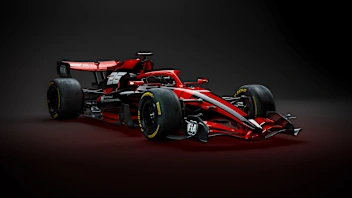 GALLERY: Check out renders of the innovative 2026 car
GALLERY: Check out renders of the innovative 2026 car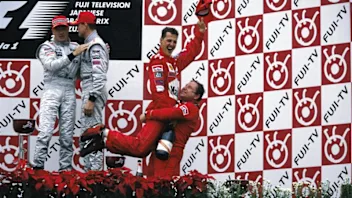 The most iconic recent championship celebrations
The most iconic recent championship celebrations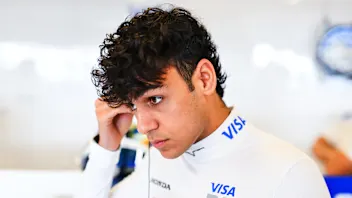 Marko ‘believed in me when others didn’t’ – Lindblad
Marko ‘believed in me when others didn’t’ – Lindblad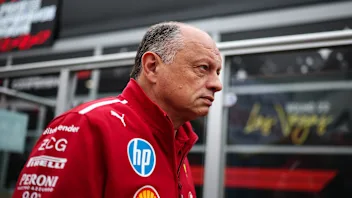 Vasseur says he misjudged impact of switching focus to 2026
Vasseur says he misjudged impact of switching focus to 2026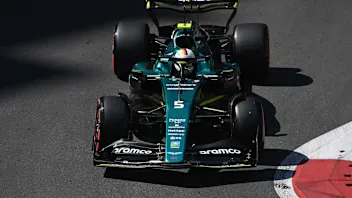 11 times F1 drivers took another driver’s car number
11 times F1 drivers took another driver’s car number EXPLAINED: The key terms for F1’s new-for-2026 rules
EXPLAINED: The key terms for F1’s new-for-2026 rules